Google Nexus 4 Review - Google's new Flagship
by Brian Klug on November 13, 2012 8:45 AM EST- Posted in
- Smartphones
- LG
- Android
- Mobile
- APQ8064
- Nexus 4
- Android 4.2
- MDM9215
The Nexus 4 is based around a 1.5 GHz Qualcomm Snapdragon S4 Pro SoC, the quad core Krait APQ8064 with Adreno 320 GPU, which is still built on a 28nm process. The combination of APQ8064 for AP and MDM9x15 for baseband is Qualcomm's Fusion 3 platform, and the Nexus 4 and Optimus G are the first phones to market based on that platform. This is a relatively unique opportunity for Nexus, which until recently wasn't really first to market with the latest and greatest silicon.
A while ago we posted our Nexus 4 and Nexus 10 performance preview. At that point we still had a lot of testing to perform, and many people noted that the Nexus 4 performance was far behind the LG Optimus G despite it being based on the same platform. Later, some people noticed that I had uploaded another set of results from GLBenchmark 2.5 to the online result browser with much better performance. The difference wasn't some over the air software update but rather that I was running some of the tests with the Nexus 4 in a ziplock bag inside the freezer to mitigate any condensation problems, and simultaneously nail down any possible thermal throttling.
I've re-run everything and can confirm obviously that there was thermal throttling going on affecting some of the results, and have included the new results wherever there was a deviation from previous. For those wondering why the LG Optimus G wasn't affected in spite of it having the same platform, the reason is because the results from the Optimus G were run in parts due to some instability affecting its ability to run a complete set of tests without crashing. The Nexus 4 has newer drivers that don't crash during a full GLBenchmark 2.5 run but as a result run the device long enough for thermal throttling to kick in.
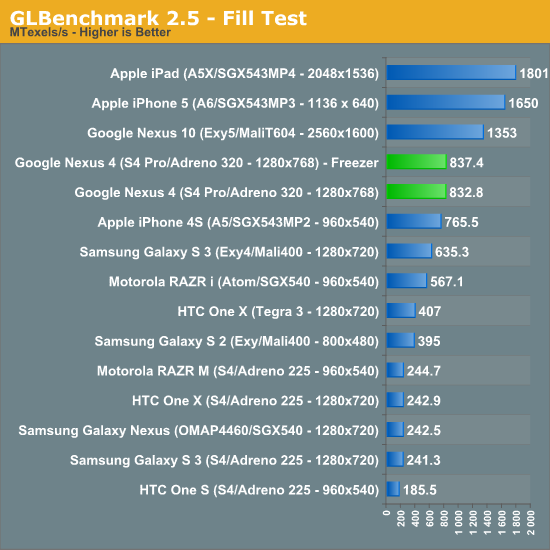
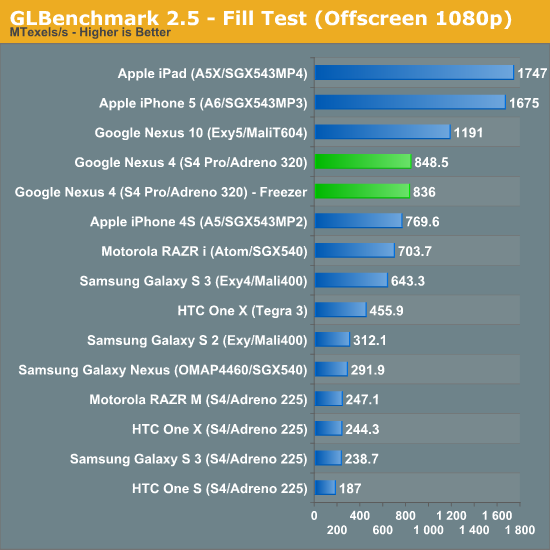
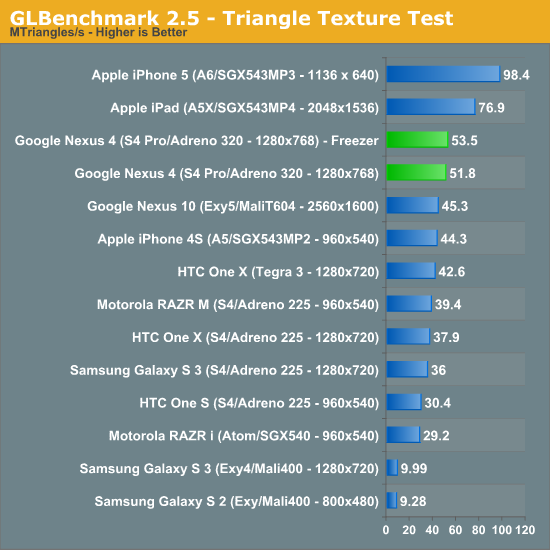
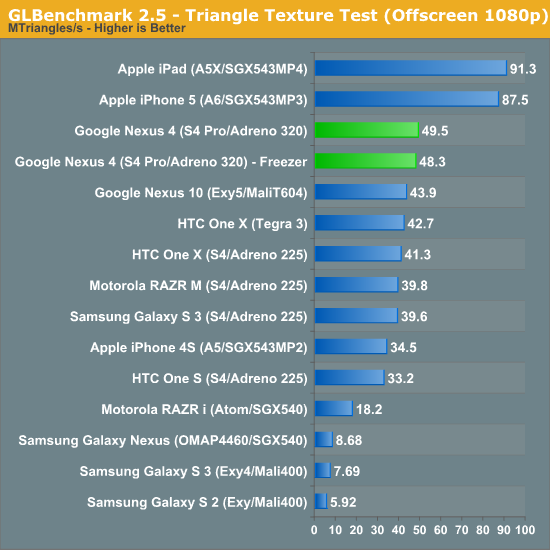
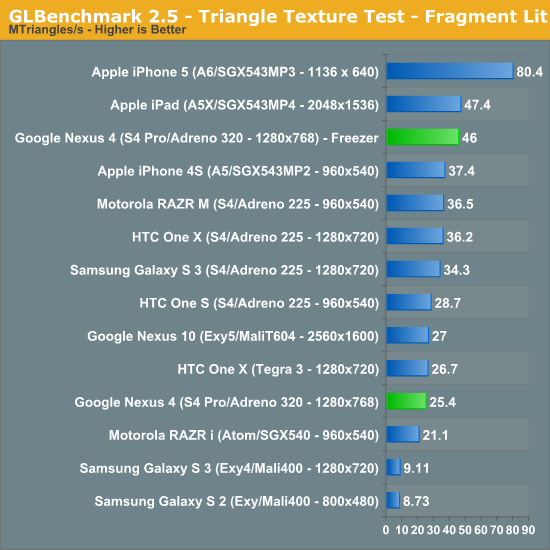
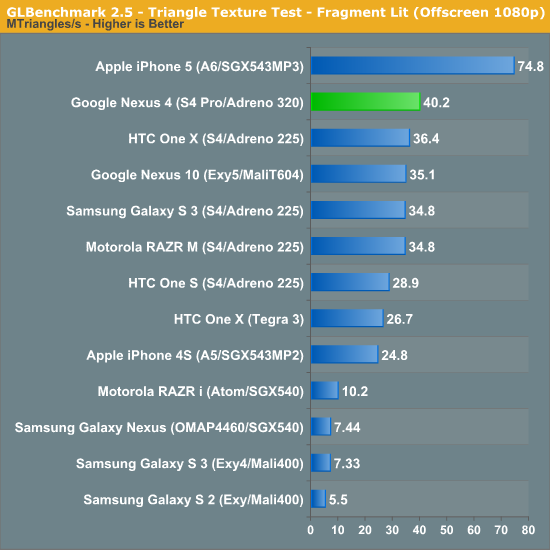
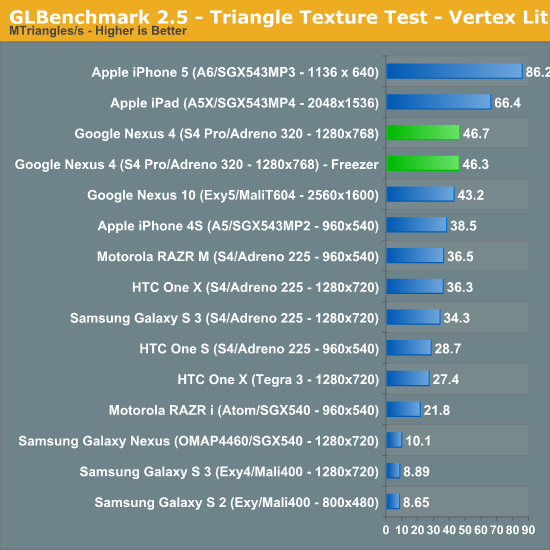
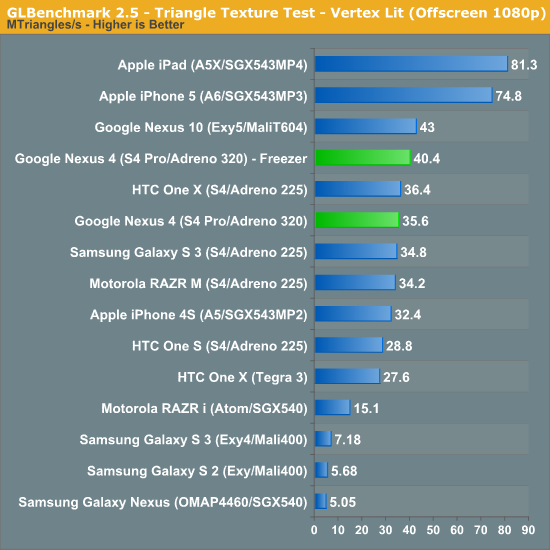
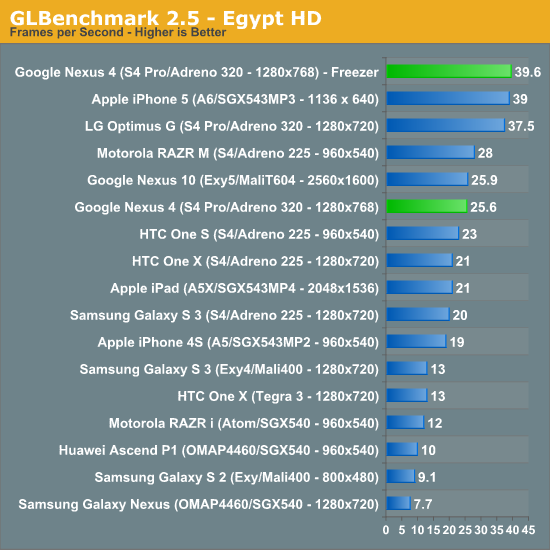
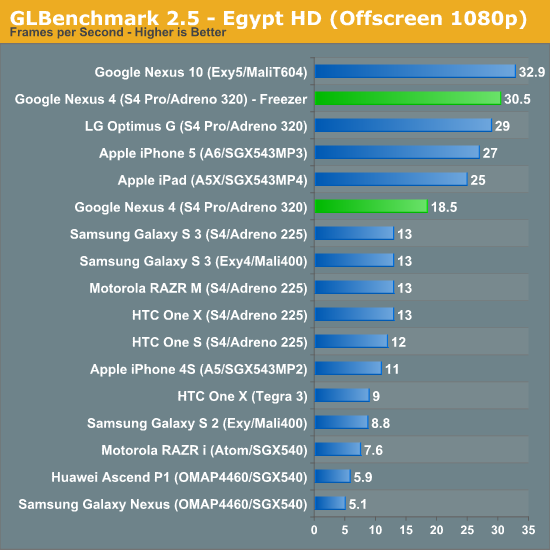
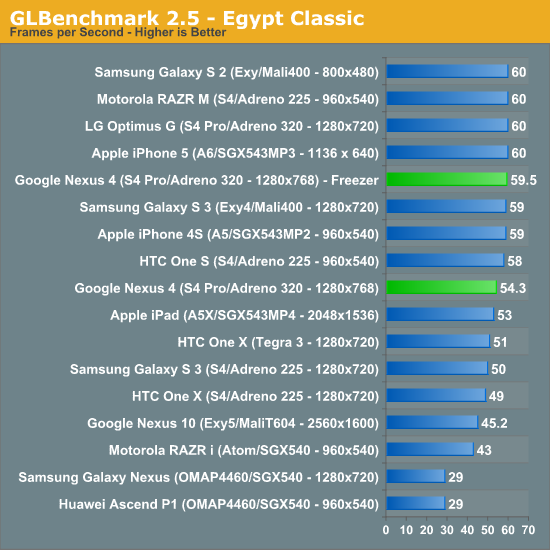
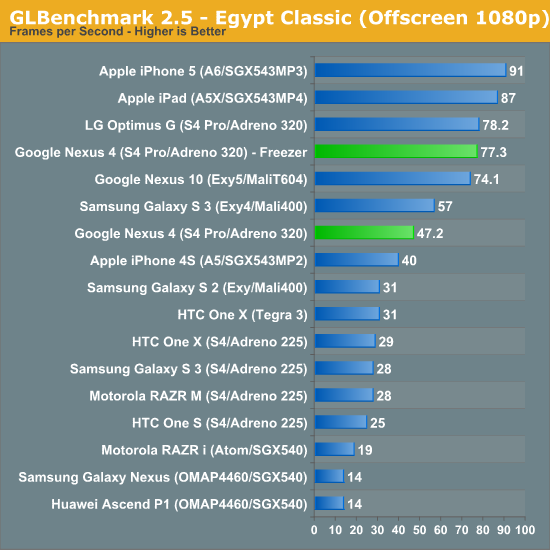
The result of the tests in the freezer results that are much closer to what we'd expect based on the APQ8064 MDP/T runs and the Optimus G numbers I saw in Korea.
When it comes to the CPU side of things there were results also affected by thermal throttling. I spaced some of those runs out (unintentionally) enough that performance didn't change, but for other things it did affect performance. I can't tell what GPU clocks end up being when the SoC decides to throttle, but it is possible to nail down what CPU performance state APQ8064 settles down into when there's throttling going on by looking at the state tables.
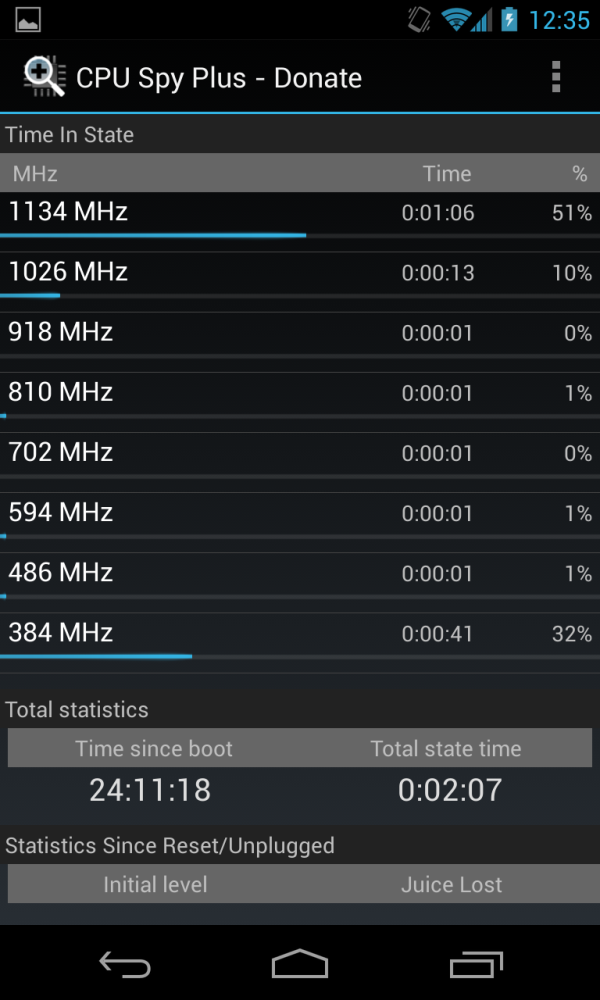
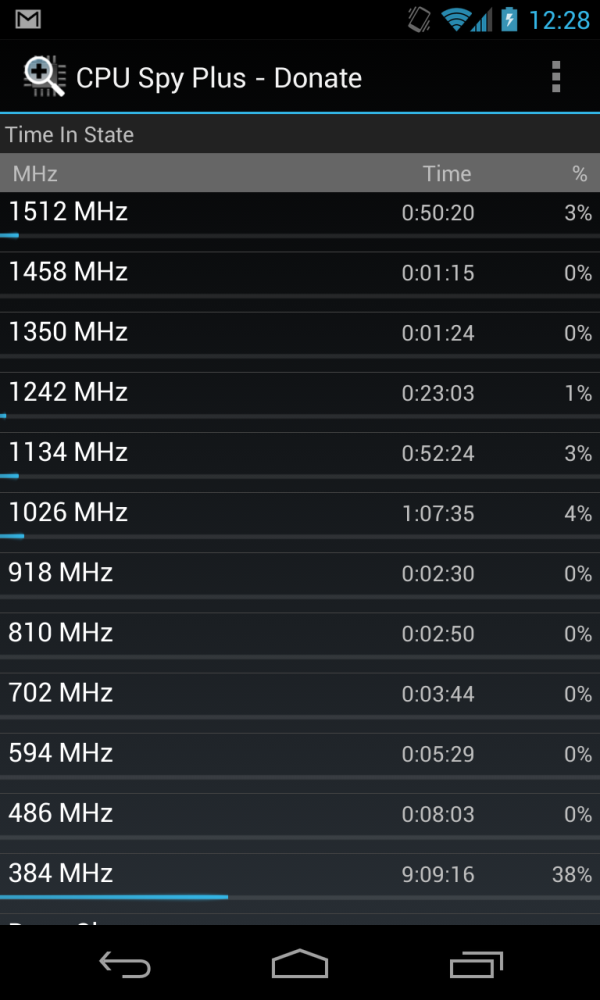
Left - 1.134 GHz during throttling (running tests), Right - All the performance states
I can see the Nexus 4 not use any of the performance states above 1134 MHz when it's getting hot, as shown in the images above. I've tweeted a link to the pastebin for thermald.conf which I believe configures the thermal cutoffs and will be interesting to kernel hackers trying to play with these values.
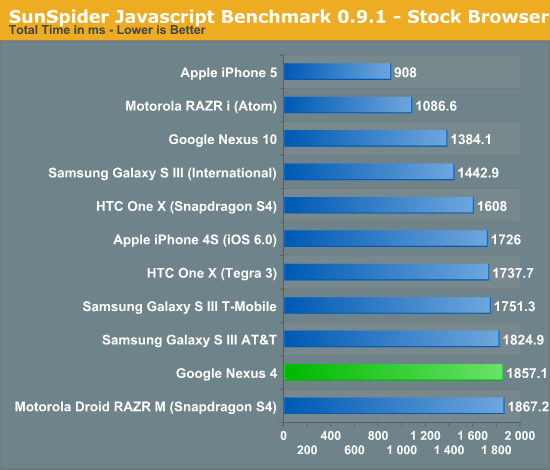
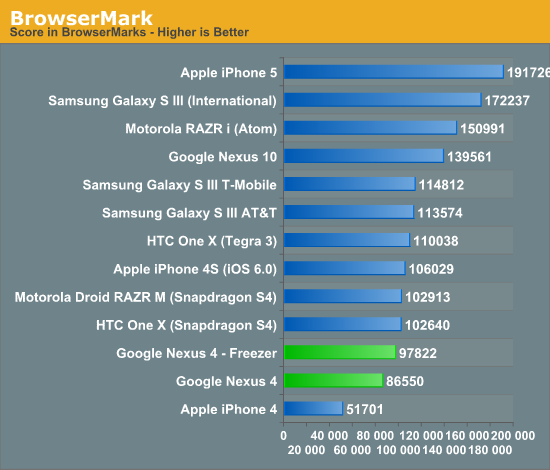
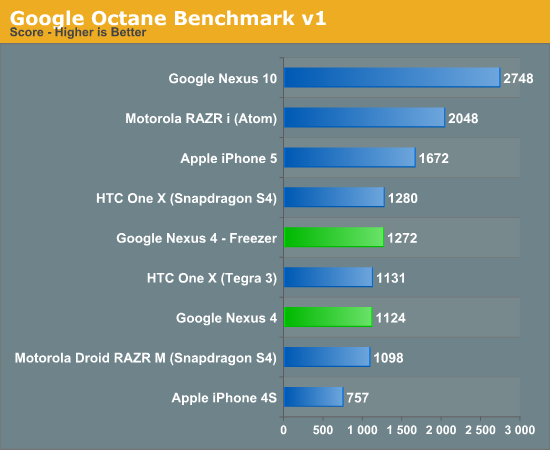
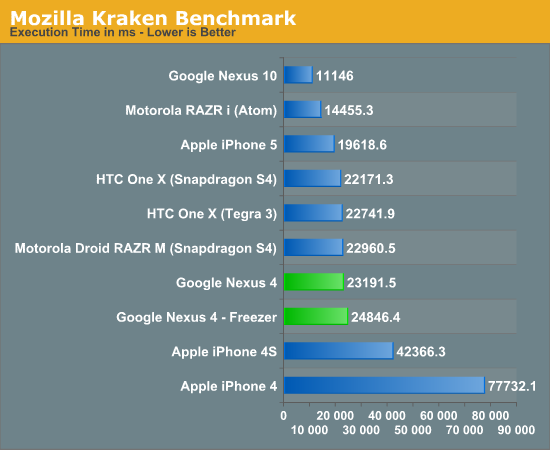
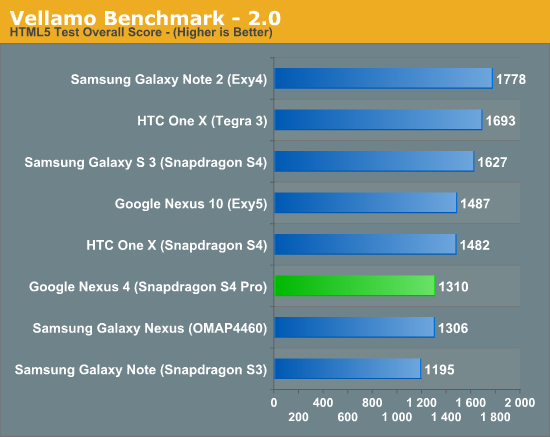
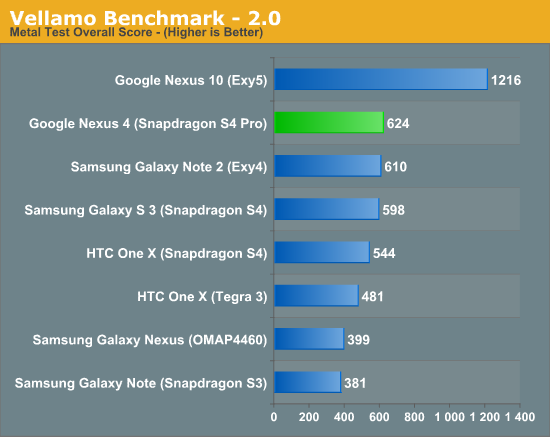
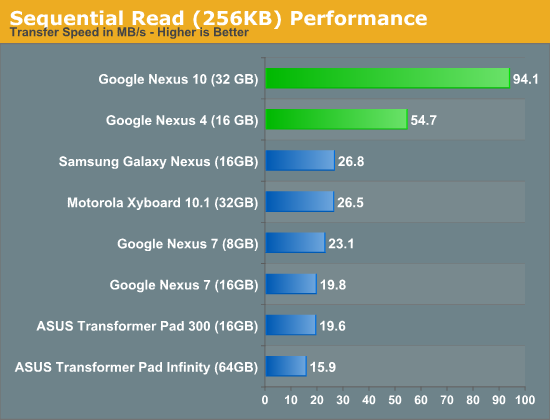
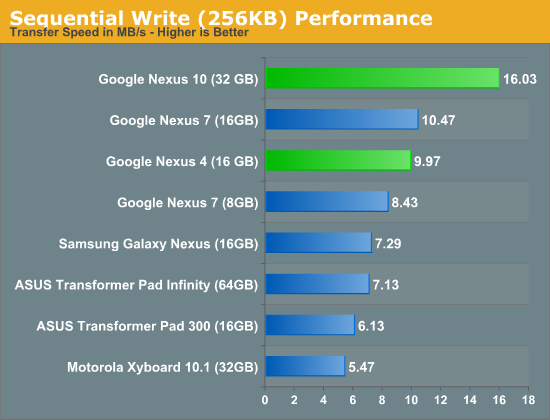
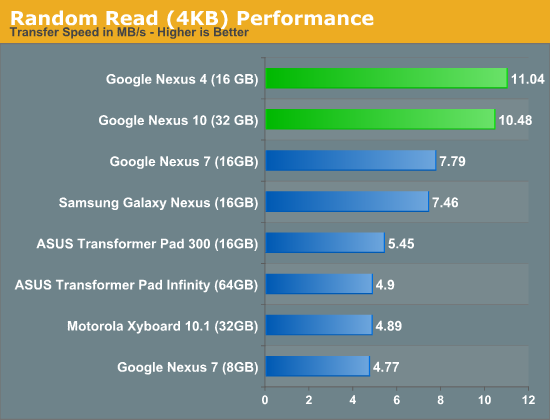
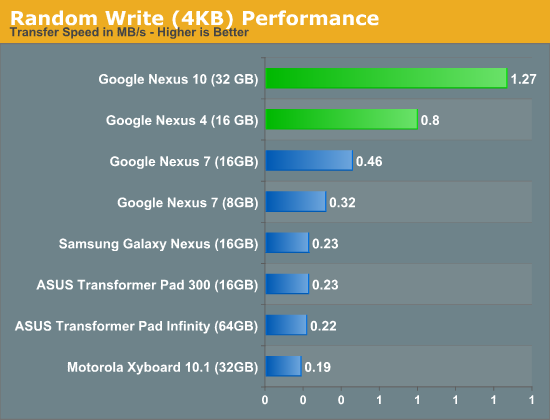
Our CPU performance side is unfortunately still dominated by JavaScript performance tests. The story there is that the Nexus 4 ships with Chrome (and originally shipped with a newer build of Chrome than what was on the market - we were running that updated version all along) and thus the mainline version of the V8 JavaScript engine. OEMs perform their own optimizations to the V8 library, and try to upstream whatever they can into the main project, but in the case of Chrome for Android that means V8 sans secret OEM sauce.










188 Comments
View All Comments
Daviii - Friday, November 16, 2012 - link
I don't understand the rant about the performance.The phone is obviously the same as the Optimus G, as well as the thermal design.
Therefore is not about the Nexus 4 getting hotter, it's about the Nexus 4 being explicitly more conservative.
It's something that can be fixed by software. Just set the same thermal thresolds and you have identical performance to the optimus G.
And to those who compare it to the iPhone 5... seriously, it's half the price! One must REALLY consider if $350 extra dollars are worth some hours of battery life. It's pretty clear that at $299 some compromises must be assumed, otherwise iPhone 5 wouldn't be an option. Would it?
maeil - Friday, November 16, 2012 - link
Great review all in all, but I just started to wonder why the galaxy note 2 is not included in any of the performance, battery & connectivity graphs? Some weeks earlier there was a review about the Note2 (T-mobile). Is Anandtech making a new review with the international version of N7100 or N7105 in the future or is there some other reason I have not figured out yet?Keep up the good work!
tuxRoller - Friday, November 16, 2012 - link
http://www.droid-life.com/2012/11/15/benchmarks-lg...Keep in mind these devices have the same SoC (the DNA was running android 4.1.1).
So, that out of the way, the DNA STOMPED the nexus 4.
On Quadrant (yes, I know, how does it determine those numbers), the DNA was about 90% faster than the nexus 4.
On smartbench the DNA was about 40% faster.
ON Vellamo html5 DNA was about 90% faster.
AnTuTu the DNA was about 40% faster.
So, I wonder if android 4.2 has pushed performance back aways.
coolkingakram - Saturday, November 17, 2012 - link
Brian,Which weather widget are you using on your nexus 4?
darwinosx - Saturday, November 17, 2012 - link
The iPhone 5 and iPad 4 sure wiped the floor with the Nexus 4.Amusing to see Android kids all of a sudden not care about LTE, glass back, no SD card slot when that was supposed to be a travesty on the iPhone 4s.
Good luck getting a signal on T-Mobile os the HSPA networks that AT&T is deprecating as fast as they can in favor of LTE.
Once again we see what a dumb idea it was to use a JVM on a smartphone.
corleyman - Saturday, November 17, 2012 - link
Unlocked GSM & powerful processor to fully take advantage of unlimited 4G data, talk & txt. That's the kind of service that I get for only $49/mo or less! :) Check out the 1-min video intro at: http://www.PenniesOverDollars.combaozebub - Sunday, November 18, 2012 - link
Before reading this article, I heard that the S3 was the king of Android devices, and that the iPhone 5 was barely catching up when it came out. Seems the propaganda is very effective in the smartphone world.I'm not sure why people on this thread are not talking about how badly the Android phones perform next to the Apple devices.
tanjinjack - Monday, November 19, 2012 - link
I must say this is an impressive review, very detailed and informative and it should serve as a very good read for all potential Nexus 4 buyers. Bravo!Nonetheless, I wish you could include more information about its thermal performance. How warm does it get and which part of the phone warms up the most? Is it uncomfortable to hold after prolonged gaming/browsing? Perhaps using a thermal monitor to inspect its surface temperature would be enough to gauge its thermal dissipation ability. To me, coming from a phone who will simply reboot due to overheating, having a cool phone will make a better experience and surely longer battery life (in term of overall acquisition of the phone)! Any chance to see that part being added?
kfayz - Tuesday, November 20, 2012 - link
How does the one x international beat the nexus 4 in all batterylife tests?! Every site I've seen complains about the one x batterylife which is whats holding me from getting one. Is the one x international in the battery tests on the latest jb update?!shaolin95 - Wednesday, December 5, 2012 - link
My point is...GLBenchmark show differences betweeen GPUs like Mali and Adreno that are totally unrealistic.All games run as good or better on the Galaxy Note 2 than the Nexus 4 yet with GLBenchmark you will think the 4 will run circles around the Note 2 so I dont see the point on that benchmark if it does not relate to real life at all.